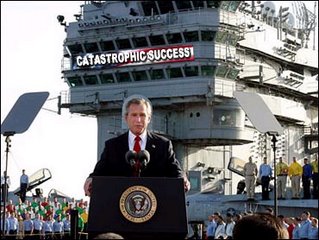Listen to this ....
4 mins 31 secs video of George W. Bush as a public speaker. Paid machine gone senile? Judge for yourself.
"George W. Bush has problems he did not have ten years ago. And so do we."
"George W. Bush has problems he did not have ten years ago. And so do we."
"On 9 July 2004, the International Court of Justice, in The Hague, gave its advisory opinion on the question of the legality of the separation barrier being built by Israel. The opinion was given pursuant to the request of the UN General Assembly of 3 December 2004. ... the court explained that its opinion related only to those sections of the separation barrier that were built, or will be built outside the Green Line [in the Occupied Territories].
The first main issue discussed in the opinion relates to the effects of the barrier on the right of the Palestinian people to self-determination. The court "recorded" the promise made by Israel that the barrier was intended only as a temporary security measure. However, the court pointed out that there is a grave fear that the barrier's route would create "facts on the ground" that lead to the de facto annexation of the territory and determination of the future borders between Israel and a Palestinian state. The court believed that de facto annexation of parts of the West Bank by Israel would violate the right to Palestinian self-determination.
The second major issue involved the legality of the barrier in light of international humanitarian law. The court rejected Israel's argument that the Fourth Geneva Convention does not apply in the Occupied Territories ...
Specifically, the court found that the separation barrier is intended to assist the settlements, the establishment of which violates Article 49 of the Convention. Also, the court pointed out that the restrictions placed on the local population located between the barrier and the Green Line are liable to lead to abandonment of the land, which also constitutes a violation of Article 49. In addition, the opinion stated that taking control of private land to build the barrier injured private property owners, and thus violated Articles 46 and 52 of the Hague Regulations of 1907 and of Article 53 of the Fourth Geneva Convention.
The third major issue that the court dealt with involved the legality of the barrier under international human rights law. In this context, the court stated unequivocally, and contrary to the position held by Israel, that international human rights law applies in its entirety in occupied territory, along with humanitarian law. The court ruled that the separation barrier violates rights set forth in conventions to which Israel is party. The court mentioned the rights to freedom of movement and the right against invasion of privacy of home and family, which are enshrined in Articles 12 and 17 of the International Covenant on Civil and Political Rights, and the right to work, to an adequate standard of living, health, and education, which are enshrined in Articles 6, 11, 12, and 13 of the International covenant on Economic, Social and Cultural rights.
It should be mentioned that the opinion dealt briefly with Israel's argument that violation of these rights is justified under international law because they are intended for legitimate security purposes. The court stated that Israel has the right and duty to protect its citizens against violence, but its defensive actions must comply with international law. ...
In its conclusion, the court stated that Israel must cease construction of the barrier, dismantle the parts of the barrier that were built inside the West Bank, revoke the orders issued relating to its construction, and compensate the Palestinians who suffered losses as a result of the barrier. The court also called on the international community to refrain from assisting in maintaining the unlawful situation that has arisen following construction of the barrier, and to take legal measures to cease Israel's violations and to ensure enforcement of the Fourth Geneva Convention."
GOP Sen. Blasts “Most Dangerous Foreign Policy Blunder Since Vietnam”
Meanwhile in the Senate, Secretary of State Condoleezza Rice told the Foreign Relations Committee the Iraqi government is living on “borrowed time.” She also declined to call the troop surge an escalation but rather an “augmentation.” Rice heard criticism from both sides of the aisle. Republican Senator Chuck Hagel of Nebraska had harsh words for the administration’s plan.Sen. Chuck Hagel: “So, Madam Secretary, when you set in motion the kind of policy that the president is talking about here, it's very, very dangerous. As a matter of fact, I have to say, Madam Secretary, that I think this speech given last night by this president represents the most dangerous foreign policy blunder in this country since Vietnam -- if it's carried out. I will resist it.”
At least fifteen Republican lawmakers have now come out against sending more troops to Iraq. Across the aisle, Democratic Senator Russ Feingold called the troop increase “quite possibly the greatest foreign policy mistake in the history of our nation.” Democratic Senator Joseph Biden also spoke.Sen. Joseph Biden: “I fear that what the president has proposed is more likely to make things worse. We hoped and prayed we would hear of a plan that would have two features: to begin to bring American forces home and a reasonable prospect of leaving behind a stable Iraq. Instead, we heard a plan to escalate the war, not only in Iraq but possibly into Iran and Syria as well. I believe the president's strategy is not a solution, Secretary Rice. I believe it's a tragic mistake.”
Republicans say the President risks a major defeat if House Democrats proceed with a non-binding resolution on the president’s troop surge.
"... They actually hanged Saddam for the judicial murder of 144 villagers in the town of Dujail who were allegedly involved in a plot to kill him in 1982.
Dujail? Here is a man who began his career in power in the late 1960s by exterminating the entire (mostly Shia) leadership of the Communist party in Iraq, went on to launch an invasion of Iran in 1980 that cost up to half a million lives, massacred his own Kurdish population in 1987-88 when some of their leaders sided with the Iranians, invaded Kuwait in 1990, and massacred Iraqi Shias in 1991 when they rebelled against his rule at the end of that war. And they hanged him for Dujail?
It’s as if they had taken Adolf Hitler alive in 1945 but ignored his responsibility for starting the Second World War and his murder of six million Jews and just put him on trial for executing people suspected of involvement in the July 1944 bomb plot. With all of Saddam’s other crimes to choose from, why on earth would you hang him for executing the people suspected of involvement in the Dujail plot?
Because the United States was not involved in that one. It was involved in the massacre of the Iraqi Communists. (The U.S. Central Intelligence Agency gave Saddam their membership lists.) It was implicated up to its ears in Saddam’s war against Iran—to the point of arranging for Iraq to be supplied with the chemicals to make poison gas, providing Baghdad with satellite and AWACS intelligence data on Iranian targets, and seconding U.S. air force photo interpreters to Baghdad to draw Saddam the detailed maps of Iranian trenches that let him drench them in poison gas.
The Ronald Reagan administration stopped Congress from condemning Saddam’s use of poison gas, and the U.S. State Department tried to protect Saddam when he gassed his own Kurdish citizens in Halabja in 1988, spreading stories (which it knew to be false) that Iranian planes had dropped the gas. It was the U.S. that finally saved Saddam’s regime by providing naval escorts for tankers carrying oil from Arab Gulf states while Iraqi planes were left free to attack tankers coming from Iranian ports. Even when one of Saddam’s planes mistakenly attacked an American destroyer in 1987, killing 37 crew members, Washington forgave him. ..."
What I really wanted in a trial for Saddam Hussein was for it to be fair, open, and impartial. Even killers like Saddam deserve a fair trial.More
I wanted a fair trial because I wished that a new regime would also be a new beginning where everyone, ruler and ruled, were judged equally and fairly. I was hoping a fair trial would set the stage for the rule of law in a born-again Iraqi and Arab society.
And I did not wish him the death penalty.
Why, I was asked time and again. Particularly in light of Saddam’s ruthless history and for his central part in the killing of my own father.
As a matter of principle, I’ve always opposed capital punishment anywhere, any time and for whatever reason.
... I particularly opposed the death penalty for Saddam and any other politician in Iraq because killing one’s political opponents (usually of the previous regime) has been a trademark in Iraqi political discourse. ...
Justice cannot be served by more killings, even if the one killed was convicted of mass murders or genocide.


"I've got an even-money bet out that says more Americans will be killed in the peace than in the war and more Iraqis will be killed by Americans in the peace than in the war. Not the first time I've made a bet that I hoped I'd lose."Time Magazinbe took about five months to come to the conclusion "the mission wasn't accomplished then, and it still is not." Bush stuck to his lie until late 2006 but admitted in December 2006 that the USA was not winning the war.